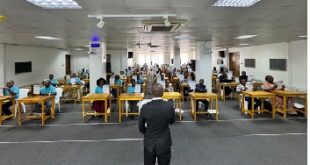After 15 years of marriage, Mrs. Shivani (Name Changed), 41, showed signs of inadequate ovarian reserve, secondary infertility, and advanced maternal age with husband having Teratozoospermia, a male factor that causes infertility. After that, she preferred Milann Fertility Hospital in Bengaluru for further medical care under the supervision of Dr. R Suchindra, Senior Consultant – Reproductive Medicine, Milann Fertility Hospital, Bengaluru.
After ovulation induction and intrauterine insemination (IUI) failed to achieve a pregnancy, Milann’s fertility quest started in 2012. In the same year, she had her first IVF cycle again, in which 12 oocytes were recovered. And the transfer of two embryos resulted in DCDA twin conception.
Dr. Suchindra stated, “A dichorionic diamniotic (DCDA) twin conception—a term used to describe conception in which two fertilised eggs implant in the womb. Depending on whether they grow from a single fertilised egg or two distinct fertilised eggs, DCDA twins can be either identical or non-identical.”
But both neonates disappointingly died after an emergency Caesarean Section due to premature rupture of membranes (PROM) at 27 weeks.
Despite transferring a single blastocyst and producing five oocytes from a second IVF round in 2014, pregnancy was not achieved. However, 2017 saw the live delivery of a healthy girl by LSCS following an IUI conception.
Between 2019 and 2021, she had six more cycles of ovulation induction and IUI at various hospitals in Bengaluru; two of these pregnancies ended in first-trimester miscarriage, while the remaining IUI treatment cycles did not result in conception.
With an antagonist regimen, Ms. Shivani started her third IVF cycle in January 2022. We frozen two 8-cell grade A embryos. However, due to inadequate endometrial thickness, two further frozen embryo transfer (FET) attempts were cancelled. Surgical procedures such as endometrial ploughing and Diagnostic Hystero-Laparoscopy (DHL) with bilateral tubal clipping was adviced in view of thin endometrium and fluid collection in the endometrial cavity.
In order to prepare the uterus for a frozen embryo transfer (FET), a procedure known as hormone replacement therapy-frozen embryo transfer (HRT-FET) involves oestrogen and progesterone supplementation was given. For women who don’t ovulate frequently, hormone replacement therapy (HRT) is a possibility that can facilitate the transfer scheduling process. However, an attempt at the cycle in September 2022 was unsuccessful.
Dr. Suchindra shared, “Injection Recombinant Follicle-Stimulating hormone and Luteinizing Hormone were used in an antagonist protocol to start a fourth IVF cycle in February 2024. Intracytoplasmic sperm injection (ICSI) was carried out after a single oocyte was retrieved. In order to confirm its euploidy, a day-5 blastocyst graded 1-4AB was biopsied for Preimplantation Genetic Testing for Aneuploidy (PGT-A).”
She further explained, “For a patient with advanced mother age and low ovarian reserve, modern methods like PGT-A and optimised uterine receptivity were essential to acheive a healthy pregnancy. Finding healthy embryos with a minimal risk of genetic diseases can be aided by PGT-A. Additionally, it can aid in avoiding the transfer of embryos with a poor implanting probability. For infertile couples, women who have advanced maternal age, experienced repeated miscarriages, or women who have had numerous unsuccessful IVF rounds, PGT-A is frequently advised.”
A downregulated frozen embryo transfer procedure was done in July 2024. The transfer of the euploid blast resulted in a successful pregnancy. The patient’s pregnancy is still going well at 25 weeks of gestation.
 Newspatrolling.com News cum Content Syndication Portal Online
Newspatrolling.com News cum Content Syndication Portal Online







